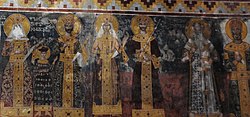
Back Ақырҭцәа Abkhazian Ureuëng Georgia ACE Хъырцэхэр ADY Georgiërs Afrikaans Cheorchianos AN Georgiaware ANG جورجيون Arabic جورجيين ARZ Xeorxanos AST Хъузхъул AV
 The Georgian kings, queens consort and the Catholicos-Patriarch depicted on a Byzantine-influenced fresco[a] wearing Byzantine dress at the Gelati Monastery, UNESCO's World Heritage Site landmark.[3] | |
| Total population | |
|---|---|
| c. 5 million[b] | |
| Regions with significant populations | |
For more, see list of population and statistical data | |
| Languages | |
| Georgian and other Kartvelian languages | |
| Religion | |
| Predominant: Significant: |
The Georgians, or Kartvelians[d] (/kɑːrtˈvɛliənz/; Georgian: ქართველები, romanized: kartvelebi, pronounced [kʰaɾtʰʷelebi]), are a nation and Caucasian ethnic group native to present-day Georgia and surrounding areas historically associated with the Georgian kingdoms. Significant Georgian diaspora communities are also present throughout Russia, Turkey, Greece, Iran, Ukraine, the United States, and the European Union.
Georgians arose from Colchian and Iberian civilizations of classical antiquity; Colchis was interconnected with the Hellenic world, whereas Iberia was influenced by the Achaemenid Empire until Alexander the Great conquered it.[7] In the early 4th century, the Georgians became one of the first to embrace Christianity and now the majority of Georgians are Orthodox Christians, with most following their national Georgian Orthodox Church,[8][9] although there are small Georgian Catholic and Muslim communities as well as a significant number of irreligious Georgians. Located in the Caucasus, on the continental crossroads of Europe and Asia, the High Middle Ages saw Georgian people form a unified Kingdom of Georgia in 1008 AD,[10][11][12] the pan-Caucasian empire,[13] later inaugurating the Georgian Golden Age, a height of political and cultural power of the nation. This lasted until the kingdom was weakened and later disintegrated as the result of the 13th–15th-century invasions of the Mongols and Timur,[14] the Black Death, the Fall of Constantinople, as well as internal divisions following the death of George V the Brilliant in 1346, the last of the great kings of Georgia.[15]
Thereafter and throughout the early modern period, Georgians became politically fractured and were dominated by the Ottoman Empire and successive dynasties of Iran. Georgians started looking for allies and found the Russians on the political horizon as a possible replacement for the lost Byzantine Empire, "for the sake of the Christian faith".[16] The Georgian kings and Russian tsars exchanged no less than 17 embassies,[17] which culminated in 1783, when Heraclius II of the eastern Georgian kingdom of Kartli-Kakheti forged an alliance with the Russian Empire. The Russo-Georgian alliance, however, backfired as Russia was unwilling to fulfill the terms of the treaty, proceeding to annex[18][19] the troubled kingdom in 1801[20] as well as the western Georgian kingdom of Imereti in 1810.[21] There were several uprisings and movements to restore the statehood, the most notable being the 1832 plot, which collapsed in failure.[22] Eventually, Russian rule over Georgia was acknowledged in various peace treaties with Iran and the Ottomans, and the remaining Georgian territories were absorbed by the Russian Empire in a piecemeal fashion through the course of the 19th century. Georgians briefly reasserted their independence from Russia under the First Georgian Republic from 1918 to 1921 and finally in 1991 from the Soviet Union.
The Georgian nation was formed out of a diverse set of geographic subgroups, each with its characteristic traditions, manners, dialects and, in the case of Svans and Mingrelians, own regional languages. The Georgian language, with its own unique writing system and extensive written tradition, which goes back to the 5th century, is the official language of Georgia as well as the language of education of all Georgians living in the country. According to the State Ministry on Diaspora Issues of Georgia, unofficial statistics say that there are more than 5 million Georgians in the world.[23]
- ^ Rapp (2016), location: 8958
- ^ Eastmond, pp. 26-61-62
- ^ Eastmond, pp. 60-28
- ^ Census data Archived 26 March 2023 at the Wayback Machine of National Statistics Office of Georgia
- ^ "საქართველოს მოსახლეობის საყოველთაო აღწერის საბოლოო შედეგები" (PDF). National Statistics Office of Georgia. 28 April 2016. Archived from the original (PDF) on 10 October 2017. Retrieved 29 April 2016.
- ^ Cite error: The named reference
Rezvaniwas invoked but never defined (see the help page). - ^ Rayfield, pp. 18—19
- ^ Suny, p. 21
- ^ Rayfield, p. 39
- ^ Suny, p. 32
- ^ Rayfield, p. 71
- ^ Eastmond, p. 39
- ^ Rapp (2016), location: 453
- ^ W.E.D. Allen, location: 1157
- ^ W.E.D. Allen, location: 337
- ^ W.E.D. Allen, location: 1612
- ^ W.E.D. Allen, location: 344
- ^ Suny, pp. 63-65-88
- ^ Rayfield, p. 259
- ^ Suny, p. 59
- ^ Suny, pp. 64-66
- ^ Suny, pp. 71-72
- ^ Statistics Archived 13 August 2020 at the Wayback Machine 22.04.2015
Cite error: There are <ref group=lower-alpha> tags or {{efn}} templates on this page, but the references will not show without a {{reflist|group=lower-alpha}} template or {{notelist}} template (see the help page).